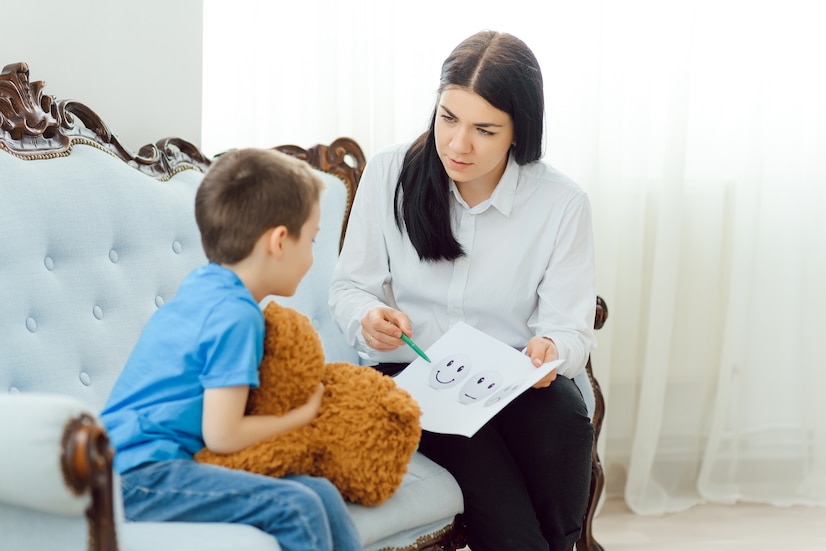
Discover the Role of Child Counsellors in Growing Children’s Mental Health
Childhood is the stage of life when a person starts to explore and mould their identity. During this period, building positive experiences for healthy growth is crucial. Over the past few decades, mental health awareness has become more prominent among parents, teachers, and caregivers. Consequently, access to counselling services has increased significantly—especially for children.
Child counsellors can help young individuals address issues with emotions or behaviours before they become more significant problems. In this blog post, we will further discuss the role of child counsellors in improving children’s mental health and why these professionals are crucial for today’s youth.
What is a Child Counselor and What Services do They Provide
A child counsellor is valuable for people struggling with emotional or behavioural issues. They provide specialised support for children experiencing problems such as anxiety, depression, or family conflict. Child counsellors use various therapeutic techniques, such as play therapy, art therapy, and cognitive-behavioural therapy, to help children address and overcome their challenges. They also work closely with parents and caregivers to develop strategies for managing challenging behaviour and supporting positive growth and development. By providing a safe and supportive environment for children to explore their thoughts and feelings, child counsellors can make a meaningful difference in the lives of young people and help them build a foundation for a healthy and fulfilling future.
How Can Child Counsellors Help Children Improve their Mental Health
Child counsellors play a vital role in helping children improve their mental health. They are trained professionals who can guide and support children, helping them navigate difficult situations and negative emotions. Throughout therapy sessions, child counsellors work to build a trusting relationship with their young clients, providing a safe and confidential space for them to express themselves without fear of judgment.
By helping children develop healthy coping mechanisms and teaching them how to communicate effectively, child counsellors can empower children to manage their emotions better and improve their mental well-being. With their expertise in child psychology, counsellors can identify potential underlying issues behind a child’s behaviour and work with them to address them, leading to positive changes in their overall mental health.
Strategies for Improving Communication between Parents and Children
Effective communication between parents and children is essential for healthy relationships and positive outcomes. However, it can be challenging to achieve. That’s why it’s vital to have the right strategies in place. One way to improve communication is to seek professional assistance, such as Certified Level 3 Online Training in Child Counselling. This training equips parents with the skills necessary to create a safe and supportive environment for their children to express their feelings and thoughts. Parents can foster honesty and trust in their relationship by actively listening and responding to their children’s concerns. With these strategies, parents can overcome communication barriers and strengthen their bonds with their children.
Techniques to Reduce Stress in Growing Children
As parents and caregivers, we want our children to grow happy and healthy. But the world can be a stressful place, even for kids. Teaching techniques for reducing stress from a young age is essential. Helping children learn healthy coping mechanisms can prepare them for a lifetime of resilience. There are plenty of techniques to choose from – everything from yoga and meditation to breathing exercises and art therapy. Finding what works for your child and making it a routine is critical. You can help your child manage stress and build a strong foundation for a happy and healthy life with some practice and patience.
Benefits of Creating Positive Home Environments for Young Minds
A positive and nurturing home environment can tremendously impact a young child’s mental and emotional development. Children who grow up in an environment filled with positivity, love, and respect are likelier to develop healthy self-esteem, strong social skills, and a positive outlook. Home is where children feel the most comfortable, safe, and secure, and it is where they learn most of their essential life skills, values, and behaviours.
Hence, creating a positive home environment is crucial for providing children with the foundation they need to grow into happy, healthy, and well-adjusted adults. Research shows that children who grow up in positive homes fare better academically, socially, and emotionally, so parents should prioritise creating a supportive and nurturing environment for their young ones.
Resources for Parents Looking to Seek Professional Help for Their Kids
Parenting is no easy task, and sometimes, our children may need the support of a professional. Seeking professional help can be daunting, but it is a courageous step towards providing the best care for your child. Parents looking to find professional services for their children can lean on community resources such as school counsellors, local mental health clinics, and paediatricians.
These resources can guide where to find support and how to navigate the process. It’s important to remember that seeking help is a sign of strength and that there is no shame in reaching out for support. With community resources and professional care, parents can provide their children with the care and assistance they need to thrive.

Conclusion
Child counsellors are essential for children’s mental health. They facilitate communication and reduce stress during formative years. Positive home environments foster development, strengthen relationships, and provide a foundation for healthy living. Seek professional help if needed. Take care of your mental health to support your child. Build better bonds over time.


